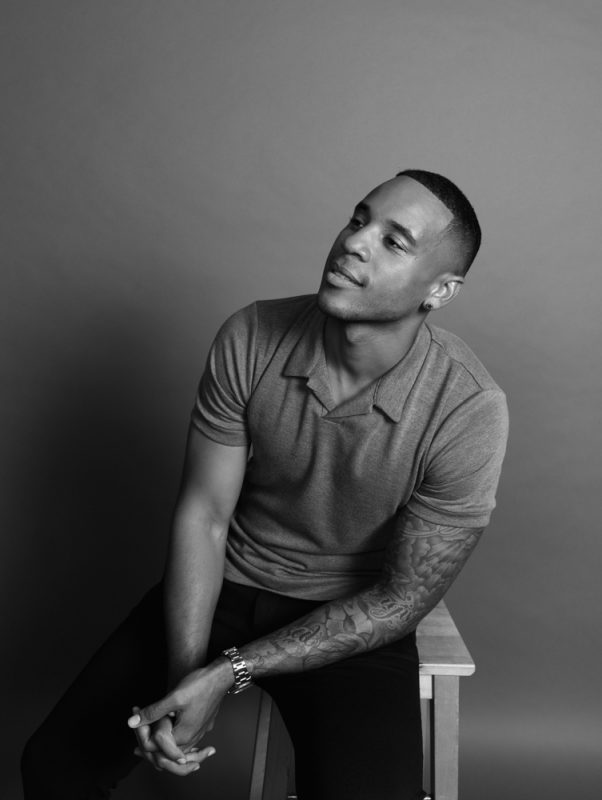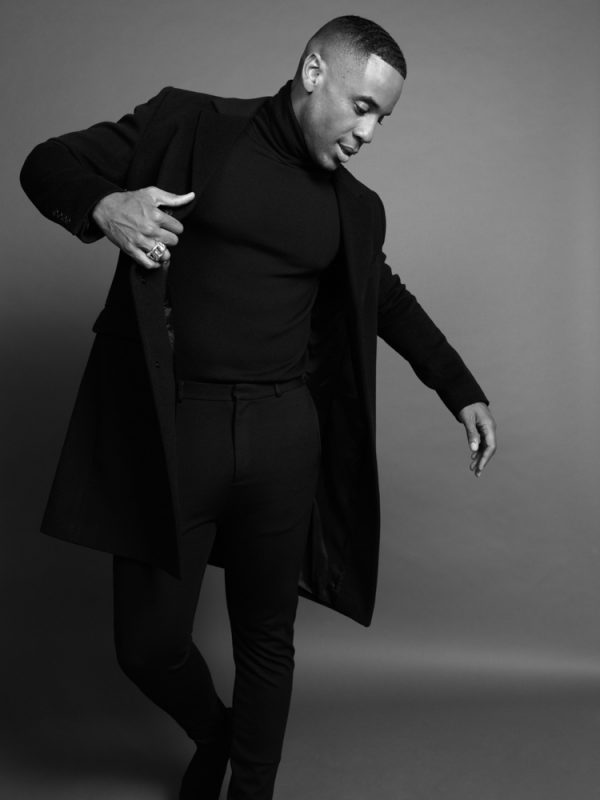FAULT Magazine In Conversation With Reggie Yates PT.1
Photography Joseph Sinclair | Styling Rachel Gold @ Red Represents | Lauren Alice @MandyCoakleyRepresents using Medik8 and La Roche Posay
Words: Miles Holder
For those who grew up watching 1990s terrestrial television, Reggie Yates has always been a household name – the recognisable young face who young POC across the country grew up with as their pillar of cultural representation on children’s television. Programs have come and gone since he made his debut on the Desmond’s in 1993, but still to this day, Reggie is still a mainstay on our television screens.
In 2013, we were introduced to a new side of Reggie through his documentary ‘Reggie Yates’s Extreme South Africa’, I say this was a “new side” of Reggie, but for many of us it was the first time we’d ever gotten to know Reggie Yates the person as opposed to the Saturday morning television presenter. Lying alone in his tent and discussing how South Africa’s race issues were affecting his own perception of self, it was a million miles away from the Reggie I remembered interviewing Atomic Kitten on ‘Smile’ or from his seldom spoken about appearance on Celebrity Fame Academy in 2005. A real Reggie; down to earth, an undeniably, unashamedly “black” Reggie Yates.
As more projects have released, the idea of Reggie Yates as a documentary maker has gone from career pivot to career-defining; critics and viewers alike now hold his work in the same esteem as one might the documentaries of Louis Theroux or Andrew Marr – a merit not many young British stars achieve.
FAULT: All those years of presenting children’s television, was the plan always to move into documentary making?
Reggie: No, and to be honest, there has never been a plan until now. It’s only in the last decade that the focus has been on doing projects which I genuinely care for. I know where I’d like to be at forty years of age in my personal and professional life and at the age of twelve I just wanted to have fun and as I’ve matured my desires for my career changed.
FAULT: Your career is an anomaly; it prompted The NewStatesman to run a story entitled ‘Does Reggie Yates Have The Weirdest Career In Television?’ – do you feel as though it’s been weird?
I don’t think I do have the weirdest career on television, I would replace “weird” with “authentic”. When I was eighteen, the BBC were telling me that I was going to be a ‘Blue Peter’ presenter and I was like, “no I’m not.” I never watched ‘Blue Peter’ growing up, and it never spoke to me, and quite frankly, I didn’t care for it. For those reasons, I didn’t do it and they just couldn’t understand and didn’t get it.
FAULT: Blue Peter is a big gig to pass up, what did you do instead?
What I went on to do was doing children shows where it felt like I was allowed to be me in, I helped create ‘The Crust’ a sitcom we did in a tower block, and it had a predominately black cast and I was twenty-one at that point. I always did things that feel right at the time, and that’s why there’s been this crazy flow but if you study my career, it’s always moved me forward, and now, everything aligns. The book makes sense next to the documentaries, the documentaries make sense with the photography, and that’s what I’m spending my life doing. All about empathy and learning, growth, sharing and I’m not just taking pictures for the sake of it like I used to do, I’ve just shot an exhibition for amnesty international on refugees, and their stories are as important as the imagery, and that’s where I am in my career.
The night before our interview I had watched ‘Reggie Yates In A Refugee Camp’ which saw him enter the largest refugee camp in Iraq alongside 30,000 Syrian refugees. A news report played on the television showing the death of an Iraqi journalist only twenty miles from the cafe where Reggie sat. This now deceased journalist, much like Reggie, placed herself in the line of danger to get her story. One does wonder if that journalist was possibly the Iraqi counterpart of Reggie Yates, one whose career mirrors his own and what it must be like to watch someone with such a shared experience, meet such a tragic end.
FAULT: What was it like to sit and hear the news on a journalist, possibly one whose careers closely mirrored your own killed so close by?
I can see why you can make the comparison, but I think I disengaged from the similarities because I’m not a war journalist, and in situations where bombs are going off, that’s the last place I’ll be. I put myself in situations which are difficult, yes, but it’s human interest stories which drive me. I look to find the heart of the issue through the people that I meet, and I don’t feel like I’m in a similar level of danger. It did sadden me though; her life was cut short because she was trying to do the right thing and open conversations and that’s wrong.
Throughout the documentary, we’re shown all the damning emotions one might expect from the people now forced to seek shelter within the refugee camp, but through all of this, Reggie reminds us of the power of friendship, love and compassion can make the worst of circumstances, that little bit easier. In the later episode ‘A Week in a Toxic Waste Dump’ we’re introduced to the Burner Boys, a group of young men working in dangerous conditions in the largest electronic waste dumps in the world – Accra’s Agbogbloshie. Much like the formerly discussed episode, we also end with the Burner Boys a little closer to happiness from when the documentary opened.
This isn’t the case with all of Reggie’s documentaries. In the previous series, we’ve seen him come face-to-face with the far-right, misogynists, racists and projects do inevitably end with his subjects no happier or less angry at the world than when the documentaries started.
FAULT: Has there has ever been a particular person who he wished he could have steered into seeing a happier way of living?
Every film there’s someone I meet that I wish I could steer to a happier future, but I think I have to be realistic about my capabilities. I can’t fix everybody that I meet in a documentary or the real world. My job is to connect with people and tell their story, but it’s not to change the world, and it’d be irresponsible and unfair for me to promise a relationship with everyone. A lot of people had said to me, “please tell me you stayed in touch with the Burner Boys and did more” but it’s hard because two weeks earlier I was in Iraq, and a month before that I was in jail in North Carolina and what about staying in touch with those guys?
I don’t do these films as a one-off project; I’m not some kid on a gap year building a house in Africa and pissing off forever. I have plans where there is legacy, and I return; for instance in Kenya and Iberia, I’ve been back several times. In Awal, I was affected by being there and my connection to the land from being of Ghanian decent I’ve started the ball rolling on a campaign to bring about change. It’s not something I feel the need to shout about here because I’m not doing it for promotion, I’m doing it out of personal responsibility as a Ghanaian the position that I’m in.
FAULT: You touched on a point saying that you’re not a student on your gap year going in and fucking off. How do you respond when people counter with the argument that you’ve gone into Iraq, made your documentary and then like you say, fucked off?
It’s a very easy answer; the difference is I’ve made a film about it which you and many people have seen across the country. It’s started a conversation which wasn’t there before, and we don’t know what the legacy of that documentary will be – it could sell internationally, and it explains displacement in a way I’ve never seen before. I’ve done something different and original, and it will effect change even if it’s just in the attitude of the audience watching it.
FAULT: Do you have any career regrets?
I don’t have any. There are things I could have done better, things go wrong all the time, there are documentaries which I’ve made which have been a bit rubbish, but I’ve learnt from all of them, and it’s cheesy textbook crap, it reigns true. It’s essential that I celebrate my failures as much as my successes because of nothing is a better teacher than failure.
In Pt2 – we’ll discuss Reggie’s new book, future projects, race and above all else – FAULTS.
Coming Soon…
Unseen: My Journey by Reggie Yates published by BBC Books, price £18.99 | THE INSIDER S2 is available on BBC3

